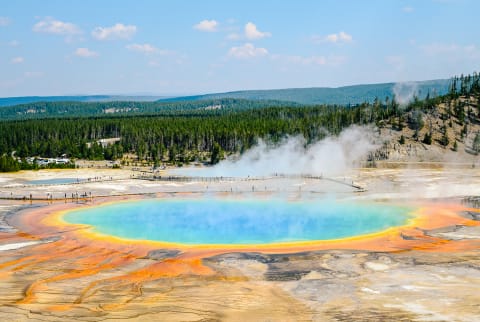Advertisement
The Next Plant-Based Protein Could Come From ... Hot Lava Microbes?


Within the last week, The Game Changers—a film about extreme athletes who follow a vegan diet—hit Netflix after becoming the bestselling documentary ever released on iTunes. Within the last month, McDonald's started serving plant-based burgers in stores across Canada. And within the last year, Beyond Meat was valued at over $10 billion. There's no doubt that we've entered a heyday for plant-based protein—and it's leading us to some pretty unexpected places.
Case in point: The team at Nature’s Fynd (formerly Sustainable Bioproducts) will soon sell a complete protein source that they found hidden in the hot springs of Yellowstone National Park.
Finding protein in a hopeless place.
What started as a project to help NASA study extreme conditions on Earth became a business venture when the Nature’s Fynd team identified an ancient microorganism that had evolved to withstand the lava chamber underneath Yellowstone.
"We wanted to see how life evolved in environments that are very different from the ones you typically find on planet Earth," Thomas Jonas, the CEO of Nature’s Fynd tells mbg of the initial discovery. "This is what took us to the volcanic springs of Yellowstone."
The microbe had survived in the harsh terrain over thousands of years—and become extremely efficient at converting carbohydrates into protein in the process. The team took samples and started to look into how to replicate the microbe in a lab setting, ultimately settling on a fermentation process reminiscent of one you'd see in a brewery.
The resulting product is 50% complete protein (meaning it has all nine essential amino acids) and contains vitamin D, iron, and calcium. Cholesterol-free and non-GMO, it's also free of antibiotics since it's raised in a controlled environment.
While it sounds straight out of a sci-fi movie, Jonas says that the process to create the newfangled protein mirrors ones you'd see in nature: "It's nature's technology. We like to think about science as a dialogue with nature... Nature has answers to a lot of the questions we are barely able to formulate."
An alt protein that's "good for people and good for the planet."
Nature’s Fynd will start selling its "microbial protein" on the market beginning in 2020. If all goes to plan, at full capacity, its 36,000-square-foot Chicago factory will be able to churn out the same volume of protein as 15,000 acres of farmland used to raise cattle.
"Cows are not efficient at transforming carbohydrates to proteins," Jonas says, referring to the fact that raising meat tends to require lots of land, resources, and emissions. "Nature didn't optimize a cow to be just a hamburger. It optimized a cow to be a cow."
Even compared to other isolated forms of plant protein like soy, hemp, and rice powder, this new product will have a relatively low environmental impact. (You still need land to grow those, after all, and the process of isolating their starches and fibers can be time- and resource-intensive.)
While the company has yet to announce what form its protein will be sold in, Jonas says it won't be a powder. Instead, he wants to make something that will "surprise people" and show them just how tasty a microbe can be. "I think people are probably thinking, 'Microbes, are you kidding? Is that really going to taste good?'" he says. "But microbes are what makes your wine and your cheese taste good—let's not forget that." Jonas also points to the ongoing kombucha craze as proof that consumers are open to giving this type of product a shot.
The product may not make hamburgers obsolete anytime soon, but Jonas hopes it becomes another category of sustainable food that can feed the masses. "It's really about bringing more choices to people. We're not trying to lecture anyone about what they should be eating," he says. "Even if it's a little different, this can be good for people and good for the planet."
Watch Next
Enjoy some of our favorite clips from classes
Enjoy some of our favorite clips from classes
What Is Meditation?
Mindfulness/Spirituality | Light Watkins
Box Breathing
Mindfulness/Spirituality | Gwen Dittmar
What Breathwork Can Address
Mindfulness/Spirituality | Gwen Dittmar
The 8 Limbs of Yoga - What is Asana?
Yoga | Caley Alyssa
Two Standing Postures to Open Up Tight Hips
Yoga | Caley Alyssa
How Plants Can Optimize Athletic Performance
Nutrition | Rich Roll
What to Eat Before a Workout
Nutrition | Rich Roll
How Ayurveda Helps Us Navigate Modern Life
Nutrition | Sahara Rose
Messages About Love & Relationships
Love & Relationships | Esther Perel
Love Languages
Love & Relationships | Esther Perel











